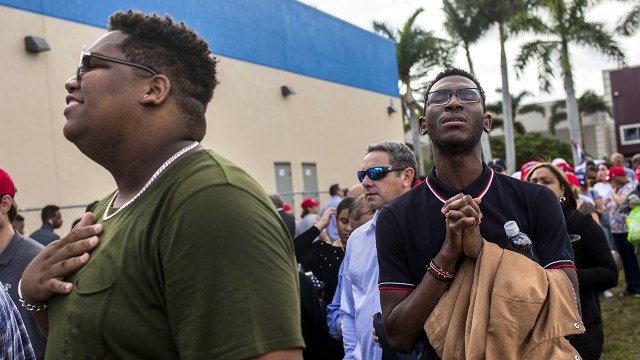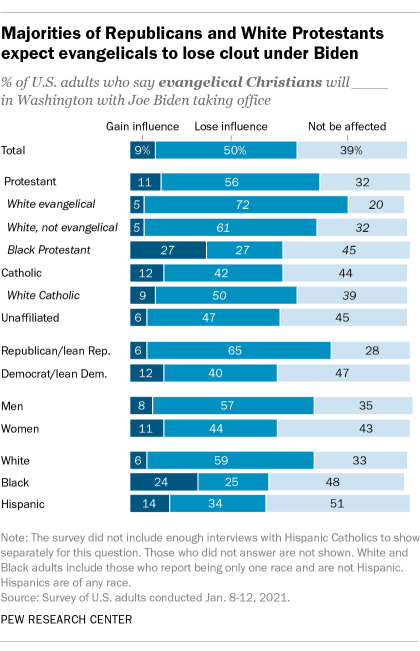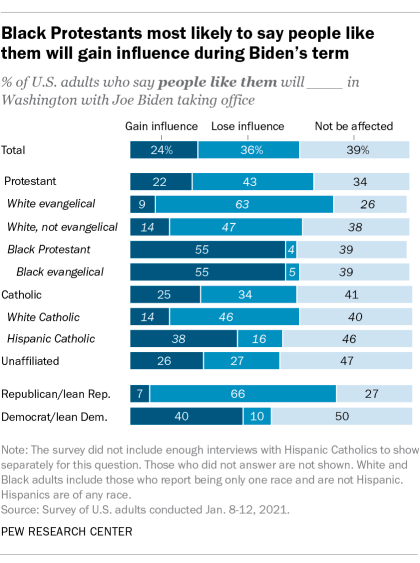
Evangelical Christians were among former President Donald Trump’s most loyal supporters. So it is no surprise that half of all U.S. adults think evangelical Christians will lose influence in Washington under President Joe Biden’s new administration while just 9% think they will gain influence, according to a January Pew Research Center survey.
Most of the remainder (39%) say evangelical Christians will not be affected by the change in administrations.
White evangelical Protestants are particularly likely to expect a loss of influence during the Biden presidency. Nearly three-quarters (72%) say evangelical Christians will lose influence, as do a clear majority of White Protestants who do not identify as born-again or evangelical (61%). In both cases, just 5% expect evangelicals to gain influence.
In general, White Americans are especially likely to say evangelical Christians will lose influence as Biden takes office. Black Americans, however, are divided on this question, including Black Protestants, who are equally likely to say evangelicals are set to gain or lose sway under Biden (27% each). Roughly two-thirds of Black Protestants (69%) identify as evangelical or born-again Christians.
Pew Research Center conducted this study to understand which groups the public views as likely to gain or lose influence with Joe Biden taking office. For this analysis, we surveyed 5,360 U.S. adults in January 2021. Everyone who took part in this survey is a member of the Center’s American Trends Panel (ATP), an online survey panel that is recruited through national, random sampling of residential addresses. This way nearly all U.S. adults have a chance of selection. The survey is weighted to be representative of the U.S. adult population by gender, race, ethnicity, partisan affiliation, education and other categories. Read more about the ATP’s methodology.
Here are the questions used for this report, along with responses, and its methodology.
Men and Republicans, including those who lean toward the Republican Party, are more likely than Americans overall to expect a loss of influence for evangelical Christians. But even among women and Democrats, far more people expect evangelicals to lose influence than gain it. Indeed, there is no demographic group in which people are more likely to say evangelical Christians will gain influence.
Moreover, Americans are more likely to foresee evangelicals losing influence than to believe it will be the case for any of more than a dozen other groups of Americans asked about in the survey, including White people, wealthy people and the military.
The survey did not ask about the influence of any other religious group, aside from evangelicals. But it did ask Americans whether they think “people like yourself” will gain or lose clout with Biden in the White House.
Looking at those results by religious group, Black Protestants are most likely to say people like them will gain influence in Biden’s Washington. More than half of Black Protestants (55%) say they expect people like them to gain influence in the nation’s capital, while just 4% anticipate losing influence. Those findings are roughly the same as among Black Americans overall. Indeed, respondents may have been thinking about other aspects of their identity – and not necessarily their religious affiliation – when answering this question.
Once again on this question, response patterns indicate that racial differences play a role. Almost two-thirds of White evangelical Protestants say they expect people like them to lose influence under Biden (63%), and just 9% think they will gain influence. Among Black evangelicals, by contrast, 55% say they think people like them will gain influence under Biden, while just 5% expect people like them to lose influence.
Biden is only the second Catholic president, after John F. Kennedy, but his political stance on certain issues – including abortion – has elicited mixed reactions from Catholic leaders. On balance, U.S. Catholics are more likely to say they expect people like them to lose influence (34%) rather than gain it (25%) as Biden takes office, but there are sharp differences by ethnicity: White Catholics are more likely than not to expect people like them to lose influence, while Hispanic Catholics are more inclined to say people like them will gain influence.
Meanwhile, Americans without a religious affiliation are about equally likely to say people like them will gain (26%) or lose (27%) clout.
Some of these findings reflect political partisanship: For example, Black Protestants and Hispanic Catholics are more likely to identify as Democrats, while White Protestants and White Catholics more often identify as Republicans. Overall, two-thirds of Republicans expect people like them to see their influence wane under Biden.
Note: Here are the questions used for this report, along with responses, and its methodology.


